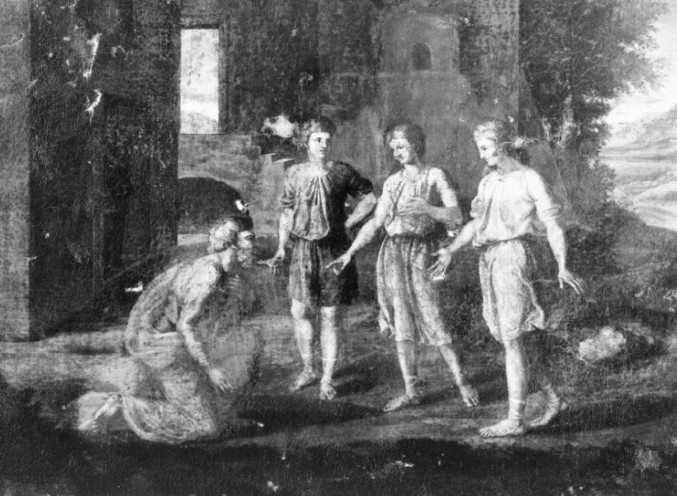Noah found favor in the eyes of the Lord… Noah was a righteous man, blameless in his generation. Noah walked with God
(Genesis 6:8–9).
What a brilliant contrast with everything else that was going on in the world. Noah ‘walked with God’—the same phrase used of his great grandfather Enoch (Genesis 5:22).
Noah was a ‘herald of righteousness’ (2 Peter 2:5). He condemned his generation for their ungodly lives. It made him highly unpopular, but it endeared him to God, and in the long run, God’s favour saved his life. God could have swept Noah away with his fellows in the day of judgement. What does one puny life matter amongst a million? We all have to die, sometime. But God is both merciful and just. He does not destroy the righteous with the wicked. He saved Noah from the Flood, just as He later delivered Lot from Sodom (Luke 17:29), and snatched the faithful in Judah from the siege armies of Babylon and Rome (Jeremiah 21:9, Luke 21:20–21). So He will rescue us from the day of judgement on this age, if we trust in Him.
Abraham once extracted this promise from God: ‘Far be it from you to do such a thing, to put the righteous to death with the wicked, so that the righteous fare as the wicked! Far be that from you! Shall not the Judge of all the earth do what is just?’ he asked
(Genesis 18:25). And God’s angel promised that if there were as few as ten righteous men in a city, He would not destroy it, for their sakes.
Building the Ark
But righteous Noah’s faith was first to be put to the test. The offer of salvation from the waters of death was free, but it depended on his doing exactly what God asked. The idea of a stupendous, world-wide flood that would destroy all life would have seemed incredible. It is even possible that rain was unknown on the earth before the time of Noah—there is a cryptic comment in the creation account, ‘The Lord God had not caused it to rain on the land, and there was no man to work the ground, and a mist was going up from the land and was watering the whole face of the ground’ (Genesis 2:5–6).
But God was quite definite about it. ‘I have determined to make an end of all flesh’, he said (Genesis 6:13).
He proceeded to instruct Noah to build an enormous boat, big enough to keep afloat not only his own family, but also a representative sample of all land creatures, together with food reserves for the duration of the flood. The dimensions were given. It was to be 450 feet by 75 feet (150m by 25m), with three decks—about the size of a small modern ocean liner. Noah was told the materials to use. Then the heavenly voice fell silent.
Noah would seem to have been a farmer by profession, according to the pronouncement of his father at his birth (Genesis 5:29). Farmers are resourceful people, and used to working hard with their hands, but a project of this size was enough to daunt the strongest heart. How did he face up to the greatest challenge of his life? How would you have felt if you had been asked to do such an unlikely thing? Would your faith have stood the test? The obstacles Noah had to face were greater than the physical one of assembling the parts of the ship, as we shall see. Yet, as the Bible says: ‘By faith Noah, being warned by God concerning events as yet unseen, in reverent fear constructed an ark for the saving of his household. By this he condemned the world and became an heir of the righteousness that comes by faith’ (Hebrews 11:7).
The most striking feature of the Ark was its colossal size. If we assume that the Bible’s cubit was the generally accepted “arm’s length” of about 1.5 feet (0.5m), then the dimensions stated in Genesis 6:15 give a gross capacity of nearly 1,500,000 cubic feet (42,000 m3).
We need not doubt that the technology was available to build such a ship. The ancients had more skill than we usually credit them with, in this respect. For example, the Apostle Paul in the First Century sailed in a boat big enough to take in 276 passengers as an incidental to its main cargo, which was wheat (Acts 27:37–38). The Phoenicians were circumnavigating Africa on a three-year voyage to the Far East in the time of Solomon (2 Chronicles 8:18 and 9:21). Iron and brass working was well known before the Flood (Genesis 4:22). Neither did Noah have to complete the Ark in great haste. He and his three sons could take their time over the work—we can assume God gave plenty of notice of His intentions.
What is staggering to contemplate, though, is the cost of the project, both in materials and in time. We know nothing of Noah’s financial circumstances, but since he seems to have built the Ark with his own hands, it does not look as though he was in a position to hire labour for the purpose. Yet every board and every nail would have to be paid for, either in cash, or in the labour it took to cut down trees and get the materials ready for use. And since he had to provide income for his family to live at the same time as he was working on the boat, he must have fitted the building into the time he had left after his normal daily work.
We shall probably not be wrong if we assume that he sank every penny of his savings, and the equivalent of all his evenings, weekends and holidays for years and years, on the great work.
You may know a friend who devotes all their time and spare funds to a project of some sort. They do it for the satisfaction of the finished product, and they may neglect family and social pleasures in the process. They have something tangible to show at the end, something to be enjoyed and to show off. It is different to sacrifice a huge slice of your life constructing an enormous lifeboat, miles from the sea, in preparation for a flood which your neighbours say will never come. Most of us, even if we started off with good intentions, would soon have been distracted and discouraged, and might even have laid down our tools.
There is a parallel between Noah’s building of the Ark, and the call of the Gospel. God demands of us, too, that we should forfeit pleasure and self-indulgence in this life, where it interferes with our devotion to His will. Jesus says, ‘Whoever does not bear his own cross and come after me cannot be my disciple. For which of you, desiring to build a tower, does not first sit down and count the cost, whether he has enough to complete it? Otherwise, when he has laid a foundation and is not able to finish, all who see it begin to mock him, saying, ‘This man began to build and was not able to finish’… So therefore, any one of you who does not renounce all that he has cannot be my disciple’ (Luke 14:27–30, 33).
We have deliberately to give over our lives to God, in trust that He will deliver us from the flood-waters of death, and raise us up to eternal life in His kingdom. As a sign of their faith, the would-be Christian is baptised, buried in water, and then brought out again to a new life, symbolising their belief in God’s power to save them from the grave. The connection with Noah’s building of the Ark is made by Peter in the New Testament. ‘God’s patience waited in the days of Noah,’ he writes, ‘while the ark was being prepared, in which a few, that is, eight persons, were brought safely through water. Baptism, which corresponds to this, now saves you, not as a removal of dirt from the body but as an appeal to God for a good conscience, through the resurrection of Jesus Christ’ (1 Peter 3:20–21).
As in the Days of Noah
Another aspect of Noah’s faith becomes apparent when we think of the abuse and jeers he must have suffered from his neighbours. The Ark would attract tourists from miles around, keen to see this curious sight, and wag their heads at the folly of the man who could squander his life and savings on such an unlikely task. And Noah in turn, the ‘herald of righteousness’, would patiently explain that God’s Day of Judgement was near, and that unless they repented, they would all be swept away. He made no converts. Very few down the generations of time have listened to the voice of the prophets of the Lord. It is just the same today. Look at these words of Jesus, warning men of the signs of his second coming:
Just as it was in the days of Noah, so will it be in the days of the Son of Man. They were eating and drinking and marrying and being given in marriage, until the day when Noah entered the ark, and the flood came and destroyed them all… so will it be on the day when the Son of Man is revealed (Luke 17:26–27, 30).
A world obsessed by material things, a world with no time for God—that is the picture Jesus paints, and the description fits our world too well. His coming in judgement will overtake our society like Noah’s flood. Yet how few take any notice of his sober words. Just think of the awful tragedy of those young couples getting married on the day Noah entered into the ark. (They were ‘marrying and being given in marriage’, Jesus said). Noah had finally completed the last stages of his work. Every plank was nailed down and smoothed, every seam caulked and sealed with pitch. The stores of fodder had been loaded in. Representatives of all the ‘kinds’ of animals and birds had converged on Noah’s homestead, presumably driven to migrate to him with a supernatural premonition of the coming disaster (Genesis 6:20). Now all was safely in, and the great door in the side of the ark was locked and sealed by God (Genesis 7:16).
Inside, Noah and his family waited, hour after hour, for the flood to begin. But outside, in the cities up and down the land, there were weddings. Young people were pledging to love and cherish each other through the coming years—years that were never to be. For the services were barely over, before the great rain came, and they were swept away.
From Jesus’ analogy it appears that the tragedy will be repeated. ‘It will come upon all who dwell on the face of the whole earth,’ he said. ‘But stay awake at all times, praying that you may have strength to escape all these things that are going to take place, and to stand before the Son of Man’ (Luke 21 V 35-36)
We still have opportunity to make the sacrifice that discipleship demands. Ignoring the taunts and jeers, we must climb into the Ark that God provides in the person of His Son. God’s longsuffering still waits. ‘The Lord is not slow to fulfill his promise, as some count slowness,’ Peter continues, ‘but is patient toward you, not wishing that any should perish, but that all should reach repentance’ (2 Peter 3:9).
David Pearce
(to be continued)





